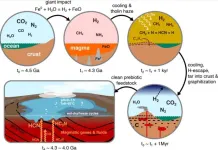(Press-News.org) CAMBRIDGE, MA — Have you ever felt reluctant to share ideas during a meeting because you feared judgment from senior colleagues? You’re not alone. Research has shown this pervasive issue can lead to a lack of diversity in public discourse, especially when junior members of a community don’t speak up because they feel intimidated.
Anonymous communication can alleviate that fear and empower individuals to speak their minds, but anonymity also eliminates important social context and can quickly skew too far in the other direction, leading to toxic or hateful speech.
MIT researchers addressed these issues by designing a framework for identity disclosure in public conversations that falls somewhere in the middle, using a concept called “meronymity.”
Meronymity (from the Greek words for “partial” and “name”) allows people in a public discussion space to selectively reveal only relevant, verified aspects of their identity.
The researchers implemented meronymity in a communication system they built called LiTweeture, which is aimed at helping junior scholars use social media to ask research questions.
In LiTweeture, users can reveal a few professional facts, such as their academic affiliation or expertise in a certain field, which lends credibility to their questions or answers while shielding their exact identity.
Users have the flexibility to choose what they reveal about themselves each time they compose a social media post. They can also leverage existing relationships for endorsements that help queries reach experts they otherwise might be reluctant to contact.
During a monthlong study, junior academics who tested LiTweeture said meronymous communication made them feel more comfortable asking questions and encouraged them to engage with senior scholars on social media.
And while this study focused on academia, meronymous communication could be applied to any community or discussion space, says electrical engineering and computer science graduate student Nouran Soliman.
“With meronymity, we wanted to strike a balance between credibility and social inhibition. How can we make people feel more comfortable contributing and leveraging this rich community while still having some accountability?” says Soliman, lead author of a paper on meronymity.
Soliman wrote the paper with her advisor and senior author David Karger, professor in the Department of Electrical Engineering and Computer Science and a member of the Computer Science and Artificial Intelligence Laboratory (CSAIL), as well as others at the Semantic Scholar Team at Allen Institute for AI, the University of Washington, and Carnegie Mellon University. The research will be presented at the ACM Conference on Human Factors in Computing Systems.
Breaking down social barriers
The researchers began by conducting an initial study with 20 scholars to better understand the motivations and social barriers they face when engaging online with other academics.
They found that, while academics find X (formerly called Twitter) and Mastodon to be key resources when seeking help with research, they were often reluctant to ask for, discuss, or share recommendations.
Many respondents worried asking for help would make them appear to be unknowledgeable about a certain subject or feared public embarrassment if their posts were ignored.
The researchers developed LiTweeture to enable scholars to selectively present relevant facets of their identity when using social media to ask for research help.
But such identity markers, or “meronyms,” only give someone credibility if they are verified. So the researchers connected LiTweeture to Semantic Scholar, a web service which creates verified academic profiles for scholars detailing their education, affiliations, and publication history.
LiTweeture uses someone’s Semantic Scholar profile to automatically generate a set of meronyms they can choose to include with each social media post they compose. A meronym might be something like, “third-year graduate student at a research institution who has five publications at computer science conferences.”
A user writes a query and chooses the meronyms to appear with this specific post. LiTweeture then posts the query and meryonyms to X and Mastodon.
The user can also identify desired responders — perhaps certain researchers with relevant expertise — who will receive the query through a direct social media message or email. Users can personalize their meronyms for these experts, perhaps mentioning common colleagues or similar research projects.
Sharing social capital
They can also leverage connections by sharing their full identity with individuals who serve as public endorsers, such as an academic advisor or lab mate. Endorsements can encourage experts to respond to the asker’s query.
“The endorsement lets a senior figure donate some of their social capital to people who don’t have as much of it,” Karger says.
In addition, users can recruit close colleagues and peers to be helpers who are willing to repost their query so it reaches a wider audience.
Responders can answer queries using meronyms, which encourages potentially shy academics to offer their expertise, Soliman says.
The researchers tested LiTweeture during a field study with 13 junior academics who were tasked with writing and responding to queries. Participants said meronymous interactions gave them confidence when asking for help and provided high-quality recommendations.
Participants also used meronyms to seek a certain kind of answer. For instance, a user might disclose their publication history to signal that they are not seeking the most basic recommendations. When responding, individuals used identity signals to reflect their level of confidence in a recommendation, for example by disclosing their expertise.
“That implicit signaling was really interesting to see. I was also very excited to see that people wanted to connect with others based on their identity signals. This sense of relation also motivated some responders to make more effort when answering questions,” Soliman says.
Now that they have built a framework around academia, the researchers want to apply meronymity to other online communities and general social media conversations, especially those around issues where there is a lot of conflict, like politics. But to do that, they will need to find an effective, scalable way for people to present verified aspects of their identities.
“I think this is a tool that could be very helpful in many communities. But we have to figure out how to thread the needle on social inhibition. How can we create an environment where everyone feels safe speaking up, but also preserve enough accountability to discourage bad behavior? says Karger.
###
This research was funded, in part, by Semantic Scholar.
END
For more open and equitable public discussions on social media, try “meronymity”
A communication system whose users reveal only a few verified aspects of their identity can empower less confident participants to speak up, researchers report.
2024-04-18
ELSE PRESS RELEASES FROM THIS DATE:
Marine microbial populations: Potential sensors of the global change in the ocean
2024-04-18
Animal and plant populations have been extensively studied, which has helped to understand ecosystem processes and evolutionary adaptations. However, this has not been the case with microbial populations due to the impossibility of isolating, culturing and analyzing the genetic content of the different species and their individuals in the laboratory. Therefore, although it is known that populations of microorganisms include a great diversity, this remains largely uncharacterized.
Now, a new study from the Institut de Ciències del Mar (ICM-CSIC) recently published in the journal Microbiome highlights the potential of marine microbial populations as indicators ...
Metacognitive abilities like reading the emotions and attitudes of others may be more influenced by environment than genetics
2024-04-18
Twin studies have proven invaluable for teasing out the effects of both genetics and the environment on human biology. In a study published April 2 in Cell Reports, researchers studied pairs of twins to look at how the interplay of genetics and environment affect cognitive processing—the way that people think. They found that some cognitive abilities appear to be regulated more by environmental factors than by genetics.
“Past research has suggested that general intelligence—often referred to as intelligence quotient or IQ—has a heritability ranging from 50% to 80%,” says senior and corresponding author Xiaohong Wan of Beijing Normal University in China. ...
Salk Professor Satchin Panda named 2023 AAAS fellow
2024-04-18
LA JOLLA (April 18, 2024)—Salk Institute Professor Satchidananda Panda has been named a 2023 Fellow of the American Association for the Advancement of Science (AAAS), the world’s largest general scientific society and publisher of the journal Science. Panda is among 502 new AAAS Fellows spanning 24 scientific disciplines who were nominated by their peers for their distinguished efforts to advance science. The election recognizes his contributions to the field of chronobiology, particularly for applications to obesity and human health.
“The Salk community congratulates ...
New urine test has higher diagnostic accuracy for prostate cancer
2024-04-18
A new urine test that measures 18 genes associated with prostate cancer provides higher accuracy for detecting clinically significant cancers than PSA and other existing biomarker tests, according to a study published April 18 in JAMA Oncology. The urine test, MyProstateScore 2.0 (MPS2), was shown to meaningfully reduce unnecessary prostate biopsies while providing highly accurate detection of worrisome prostate cancers, the researchers concluded.
“In nearly 800 patients with an elevated PSA level, the new test was capable of ruling out the presence of clinically significant prostate cancer with remarkable accuracy. This allows patients to avoid more burdensome and ...
Floating solar’s potential to support sustainable development by addressing climate, water, and energy goals holistically
2024-04-18
Milan, April 17 2024 – The study, published in Nature Energy, is among the first to explore the FPV at the continental scale, finding that FPV installed at existing major reservoirs could produce 20-100% of the electricity expected from Africa’s planned hydropower dams. Using a state-of-the-art energy planning model covering the continent’s entire energy system, the researchers found that FPV is cost-competitive with other renewables and thus a key part of Africa’s future energy mix.
"Floating solar is fast becoming cost-competitive with land-based solar, and ...
Drawing a line back to the origin of life
2024-04-18
Scientists in Cambridge University suggest molecules, vital to the development of life, could have formed from a process known as graphitisation. Once verified in the laboratory, it could allow us to try and recreate plausible conditions for life's emergence.
How did the chemicals required for life get there?
It has long been debated how the seemingly fortuitous conditions for life arose in nature, with many hypothesises reaching dead ends. However, researchers at the University of Cambridge have now modelled how these conditions could occur, producing the necessary ingredients for life in substantial ...
Data-driven music: Converting climate measurements into music
2024-04-18
A geo-environmental scientist from Japan has composed a string quartet using sonified climate data. The 6-minute-long composition—entitled “String Quartet No. 1 “Polar Energy Budget”—is based on over 30 years of satellite-collected climate data from the Arctic and Antarctic and aims to garner attention on how climate is driven by the input and output of energy at the poles. The backstory about how the composition was put together publishes April 18 in the journal iScience as part of a collection “Exploring the Art-Science Connection.”
“I strongly hope that this manuscript marks a significant turning point, transitioning ...
Palaeontology: Discovery of new ancient giant snake in India
2024-04-18
A new ancient species of snake dubbed Vasuki Indicus, which lived around 47 million years ago in the state of Gujarat in India, may have been one of the largest snakes to have ever lived, suggests new research published in Scientific Reports. The new species, which reached an estimated length of between 11 and 15 metres, was part of the now extinct madtsoiidae snake family, but represented a distinct lineage that originated in India.
Debajit Datta and Sunil Bajpai describe a new specimen recovered from the Panandhro Lignite Mine, Kutch, Gujarat State, India, which dates ...
Racial discrimination and metabolic syndrome in young Black adults
2024-04-18
About The Study: The findings of this study with 322 participants suggest that racial discrimination predisposes Black young adults to metabolic syndrome via sleep problems and inflammation, which may serve as actionable targets for prevention in minoritized populations that could reduce existing disparities and promote health equity.
Authors: Nia Heard-Garris, M.D., M.B.A., M.Sc., of the Northwestern University Feinberg School of Medicine in Chicago, is the corresponding author.
To access the embargoed study: Visit our For The Media website at this link https://media.jamanetwork.com/
(doi:10.1001/jamanetworkopen.2024.5288)
Editor’s Note: Please ...
Adherence to American Cancer Society nutrition and physical activity guidelines among cancer survivors
2024-04-18
About The Study: In this cross-sectional study using data from the Behavioral Risk Factor Surveillance System for 10,000 cancer survivors, only 4% of cancer survivors adhered to all four American Cancer Society nutrition and physical activity guidelines, with the mean number of guidelines met being 2.0. Improved understanding of guideline adherence and its determinants may guide oncologists and general internists in providing recommendations for their patients who have completed cancer treatments.
Authors: Kathryn Norman, M.D., of the Beth Israel Deaconess Medical Center in Boston, is the corresponding author.
To access the embargoed study: Visit our For The ...
LAST 30 PRESS RELEASES:
Paleontologist Stephen Chester and colleagues reveal new clues about early primate evolution
UF research finds a gentler way to treat aggressive gum disease
Strong alcohol policy could reduce cancer in Canada
Air pollution from wildfires linked to higher rate of stroke
Tiny flows, big insights: microfluidics system boosts super-resolution microscopy
Pennington Biomedical researcher publishes editorial in leading American Heart Association journal
New tool reveals the secrets of HIV-infected cells
HMH scientists calculate breathing-brain wave rhythms in deepest sleep
Electron microscopy shows ‘mouse bite’ defects in semiconductors
Ochsner Children's CEO joins Make-A-Wish Board
Research spotlight: Exploring the neural basis of visual imagination
Wildlife imaging shows that AI models aren’t as smart as we think
Prolonged drought linked to instability in key nitrogen-cycling microbes in Connecticut salt marsh
Self-cleaning fuel cells? Researchers reveal steam-powered fix for ‘sulfur poisoning’
Bacteria found in mouth and gut may help protect against severe peanut allergic reactions
Ultra-processed foods in preschool years associated with behavioural difficulties in childhood
A fanged frog long thought to be one species is revealing itself to be several
Weill Cornell Medicine selected for Prostate Cancer Foundation Challenge Award
Largest high-precision 3D facial database built in China, enabling more lifelike digital humans
SwRI upgrades facilities to expand subsurface safety valve testing to new application
Iron deficiency blocks the growth of young pancreatic cells
Selective forest thinning in the eastern Cascades supports both snowpack and wildfire resilience
A sea of light: HETDEX astronomers reveal hidden structures in the young universe
Some young gamers may be at higher risk of mental health problems, but family and school support can help
Reduce rust by dumping your wok twice, and other kitchen tips
High-fat diet accelerates breast cancer tumor growth and invasion
Leveraging AI models, neuroscientists parse canary songs to better understand human speech
Ultraprocessed food consumption and behavioral outcomes in Canadian children
The ISSCR honors Dr. Kyle M. Loh with the 2026 Early Career Impact Award for Transformative Advances in Stem Cell Biology
The ISSCR honors Alexander Meissner with the 2026 ISSCR Momentum Award for exceptional work in developmental and stem cell epigenetics
[Press-News.org] For more open and equitable public discussions on social media, try “meronymity”A communication system whose users reveal only a few verified aspects of their identity can empower less confident participants to speak up, researchers report.






